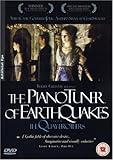Eye For Film >> Movies >> The Piano Tuner Of Earthquakes (2005) Film Review
Ten years after their feature debut with Institute Benjamenta (1995), the brothers Quay have re-emerged from the workshop with The Piano Tuner Of Earthquakes and although the shadowy monochrome of their first film has given way to murky, bleached-out colours, the twins have lost none of their ability to confound and unsettle. Like Jan Svankmajer, they blend live action and animation to create a surreal hermetic vision that is as beautifully seductive as it is chillingly inaccessible. The mise-en-scene may resemble a baroque painting by one of the Old Masters, but its exquisitely layered textures are also occasionally ruffled by touches of sadism, horror and the downright bizarre, including an automated model of a woodchopper who repeatedly removes his own leg, a boat rowed by disembodied hands and a decidedly penile music box.
On the eve of her wedding to Adolfo (Cesar Sarachu), renowned opera singer Malvina van Stille (Amira Casar) is mysteriously struck dead mid-performance and her body secreted away by Dr Emmanuel Droz (Gottfried John), who has been stalking her for some time. Not long afterwards, Droz invites a sensitive piano tuner, Felisberto Fernandez (also played by Sarachu), to his villa/asylum on a secluded Mediterranean island, asking him to calibrate a set of seven elaborate hydraulic automata of unclear purpose in time for a final performance at a special hour before a special audience. Intrigued, not least because his own likeness appears to be depicted alongside Droz's on a fresco in the villa's atrium, Felisberto takes the job and, when he is not working, spends his waking and sleeping hours exploring these strange new environs.

It is not long before Felisberto is drawn to the enigmatic genius of his host as well as to the comely charms of Assumpta the maid (Assumpta Serna), but what fascinates him even more is the beautiful veiled "patient" Malvina with the siren's voice who insists on calling him Adolfo. As the time fast approaches for Droz to lift the curtains on his "own small contribution to the operatic canon", Felisberto searches in vain for the seventh automaton and tries to devise an exit strategy, only to realise, too late, that he cannot escape his own central part in the timeless spectacle unraveling before his very eyes.
Concerned as it is with the oppositions of mind and machine, free will and determinism, The Piano Tuner Of Earthquakes is not unlike Mamoru Oshii's futuristic Ghost In The Shell films in its overall theme, except that it is set in a pre-industrial age of cogs, cranks and clockwork and looks as though it might have been made any time in the last 50 years. Making few concessions to the speedy trends of today's movies, the Quays prefer to let their puzzling plot unfold at its own leisurely pace, with plenty of time for detours and deviations. Their principal reference points, far from being cinematic, are literary (Adolfo Bioy's novella The Invention Pf Morel, Raymond Roussel's novel Locus Solus, Jules Verne's story The Carpathian Castle), investing the film with a timeless classicism that is signaled from the very outset by a quote from the Roman historian Sallust: "These things never happen, but are always."
It is open to question whether our postmodern age has much room for a film so defiantly outmoded and unhurried. The elements that will transport some viewers into oneiric raptures will no doubt merely send others into the land of Nod, but it is well worth surrendering to its hypnotic spell, for rarely are films so rich, quaint and utterly haunting.
When asked by Assumpta if he believes in dreams, Felisberto replies that he does, even if, as he puts it, "certain signs in dreams reveal no more than the postman's knock does about the contents of a letter." The Piano Tuner Of Earthquakes similarly offers a succession of dreamlike images and paradoxical conceits that rap insistently at the viewers' subconscious without ever fully revealing the logic of their inner workings. Or, again, to borrow Felisberto's own description of his experiences on the island: "It is as if I am in someone else's imagination."
The manipulator behind the scenes appears to be Droz (portrayed by John with gaunt melancholy), who is Prospero, Svengali, Caligari, Mabuse and Frankenstein all rolled into one malevolent, mesmerising, mad whole; but in his way he has become as enchanted as the others within this impenetrable hall of mirrors, so that it is left ultimately to the film's directors alone to pull all the strings and for us to try to find a way out of their diabolically labyrinthine construction.
Not since Alain Resnais' modernist masterpiece Last Year In Marienbad (1961) has a film had such power to entrap viewers in its infuriating hermeneutics, with meaning always just beyond reach on the other side of the screen.
Reviewed on: 18 Feb 2006


















